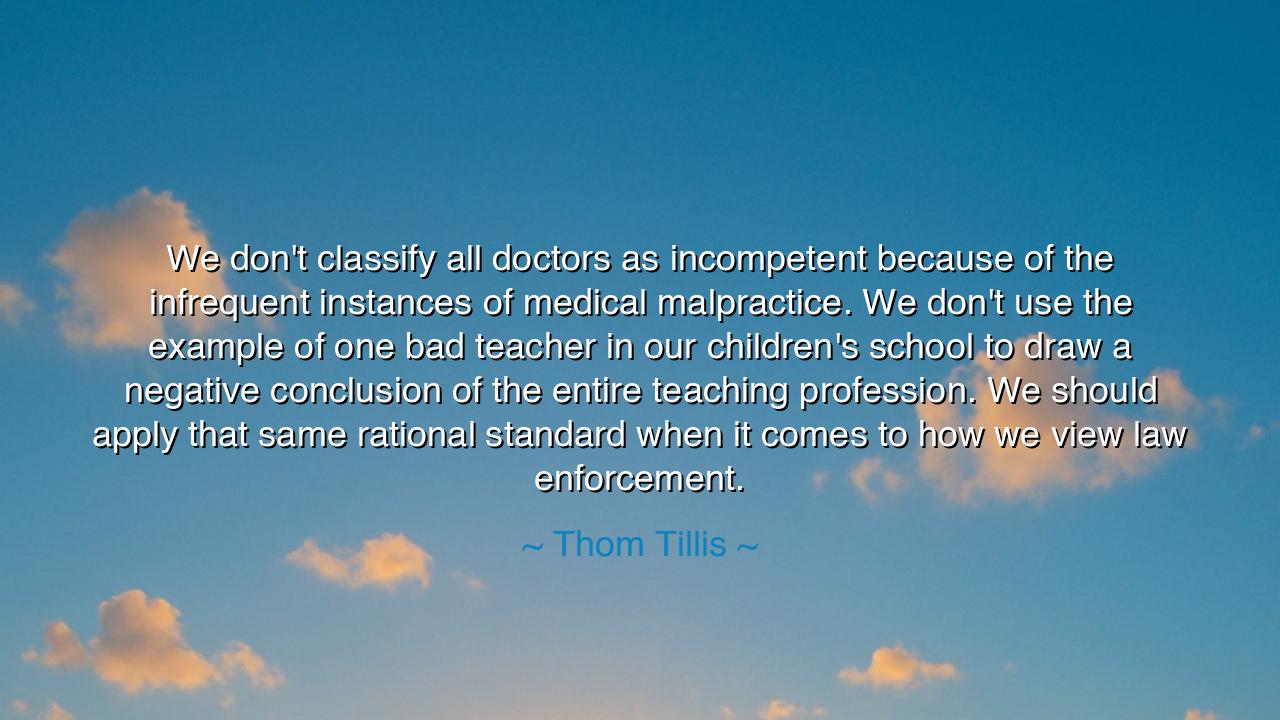
We don't classify all doctors as incompetent because of the
We don't classify all doctors as incompetent because of the infrequent instances of medical malpractice. We don't use the example of one bad teacher in our children's school to draw a negative conclusion of the entire teaching profession. We should apply that same rational standard when it comes to how we view law enforcement.






In the thoughtful words of Thom Tillis, “We don’t classify all doctors as incompetent because of the infrequent instances of medical malpractice. We don’t use the example of one bad teacher in our children’s school to draw a negative conclusion of the entire teaching profession. We should apply that same rational standard when it comes to how we view law enforcement.” we are confronted with an age-old truth: judging the whole by the actions of the few is a fallacy that distorts our understanding of complex systems and the individuals that serve within them. Tillis calls us to recognize the rationality of applying the same standard of fairness to professions that require great responsibility, like law enforcement, just as we do with medicine and education. This wisdom reaches deep into the heart of what it means to judge rightly and fairly—an ancient ideal that holds truth across the ages.
The origin of this quote lies in Tillis’s call for a balanced perspective on law enforcement. In a time when police misconduct is too often highlighted in the media, Tillis urges the public to resist the temptation to generalize the actions of a few officers to the whole institution of law enforcement. Just as we do not dismiss the entire field of medicine or education because of the failings of a few individuals, so too must we respect the dedicated service of the vast majority of police officers who work tirelessly to serve their communities. This is a plea for rational thought in the face of emotionally charged issues, a call to embrace fairness and wisdom when considering the broader societal roles of institutions and professions.
In the ancient world, such wisdom was often found in the teachings of the Stoics, who emphasized the need to judge actions and individuals based on reason, not emotion. Epictetus, one of the great Stoic philosophers, taught that to judge fairly, one must look beyond the immediate circumstances and see things for what they truly are—individual actions must not be taken as representations of entire groups. In his writings, Epictetus often spoke about how to manage anger and avoid the distortion of truth by observing situations rationally and calmly, without being swayed by the excessive emotions of others. Just as he cautioned against the unfair treatment of one person based on the actions of another, Tillis is reminding us of the importance of reason in our judgments of institutions, whether they be the medical field, education, or law enforcement.
Consider the story of Socrates, who, despite being condemned by the Athenian court for corrupting the youth and impiety, did not seek to vilify the system or the majority that condemned him. Instead, Socrates believed in the value of reasoned discourse and understood that the actions of a few individuals did not reflect the whole of the state or the laws it upheld. He believed that an unjust verdict could be challenged, but not by turning the people against the entire system, but rather by striving to reach a greater understanding of justice. In a similar vein, Tillis advocates for understanding the broader context and recognizing the value of institutions even when there are imperfections within them. It is a call to resist blanket judgments and to preserve reason above all else.
In modern times, the field of medicine offers another instructive example. We do not demonize all doctors because of the rare instances of malpractice. Instead, we understand that medicine, like any profession, involves human beings, and as such, there will always be errors and failures. But these mistakes are not reflective of the entire field or of the many doctors who dedicate their lives to healing and caring for others. This approach encourages us to keep the larger picture in view: while we must address mistakes, we must not lose sight of the service and commitment that most practitioners show. Just as we separate an individual failure from the value of the profession, so must we in law enforcement, recognizing that the majority of officers serve their communities with honor and integrity.
The lesson from Tillis’s statement is both clear and urgent: we must guard against sweeping generalizations and hasty judgments when it comes to complex institutions and professions. The actions of a few should not define the value of the whole. In a world often driven by emotional reactions, we must learn to be reasoned and thoughtful in our responses, striving to see the full picture before making conclusions. We must practice fairness and rationality, understanding that all systems—whether in medicine, education, or law enforcement—are made up of individuals, and those individuals may fall short at times, but they do not diminish the entire institution.
In our own lives, we can take this lesson to heart by choosing to judge others fairly and reasonably, without allowing emotions or individual failures to cloud our judgment. Whether we are in a position to evaluate systems, or we simply face challenges in our personal relationships, we must strive to apply a rational standard in our interactions with others. Let us seek balance, not overreacting to the actions of a few, and always remember that integrity and value lie not in isolated incidents but in the overarching principles that guide any organization or profession. Through wisdom and reason, we can build a more just and equitable society.






AAdministratorAdministrator
Welcome, honored guests. Please leave a comment, we will respond soon